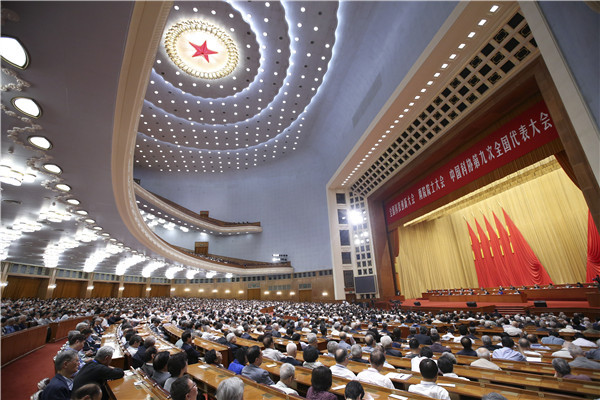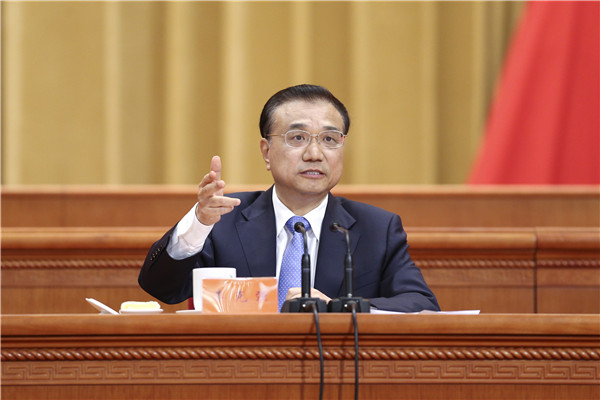
The national conference on science and technology, the biennial conference of China’s two top think tanks, the Chinese Academy of Sciences and Chinese Academy of Engineering, and the ninth national congress of the China Association for Science and Technology are held in Beijing, capital of China, May 30, 2016. [Photo/Xinhua]
Premier Li Keqiang on May 30 urged deepening reform and encouraging the enthusiasm of scientific and technological workers to build China into an innovation-driven country and a leading power in science and technology.
The Premier made the remarks at an event conflating the national conference on science and technology, the biennial conference of Chinese Academy of Sciences and Chinese Academy of Engineering and the national congress of the China Association for Science and Technology.
Premier Li said that President Xi Jinping’s instructions to realize the objectives of becoming a world-leading S&T power and an innovative country should be firmly carried out as innovation is important to national destiny.
For thousands of years China has created many of the world’s leading innovative inventions and contributed greatly to the world’s civilization and progress, but the country has missed scientific revolutions many times for different reasons, the Premier said.
However, since the foundation of the People’s Republic of China, especially since China carried out the reform and opening-up policy, the country has set up an independent scientific technology system and entered a new era of comprehensive innovation.
National scientific researchers, especially academicians at the Academy of Sciences and Academy of Engineering, created many innovations and achievements and made outstanding contributions, and the contribution of the China Association for Science and Technology also cannot be ignored, the Premier said.
He pointed out that as the world’s scientific, technological and industrial revolution is emerging and interacting, innovation is not only a solid base for China to push forward its economy toward a middle to high-end level at middle-to high speed, an important part in pushing supply-side structural reform, but it’s also a big support for creating new advantages in international competitiveness.
Major meetings of the central government stressed the importance of innovation and China’s policy-makers also put forward a series of policies to support the development of innovation, the Premier said. So all the regions and departments should make it their own responsibility to innovate in all fields and development chains and develop innovation-driven industries to build China into a leading power in science and technology, he added.
To better perform and carry out the supporting policies and fully use scientific innovation in the comprehensive innovation, the Premier asked that three measures should be taken.
First is to increase investment in fundamental research. He stressed to steadily support long-term scientific research - by 2020 the R & D intensity should reach 2.5 percent - and set up high-level innovation platforms, such as national research laboratories and comprehensive national science centers. Scientific research centers and universities should play leading roles in innovation development, and the forces of enterprises and social forces should also be aroused to increase the original innovation powers.
Second is to break the bottlenecks of industrializing application research. The Premier said an innovation system that is market-oriented and led by enterprises should be set up, a batch of national strategic scientific projects should be pushed and new industries and economic growth points that can bring benefits not only in the short term, but also in the long run, should be formed.
Third is to promote coordinated innovation. Innovation mechanisms and platforms based on the internet will be forged to promote coordination among enterprises, scientific research institutions and universities. Makers and integrative innovation elements such as talent, technology, and capital, will create new driving forces and upgrade traditional industries.
Technological innovation should be stimulated by system and mechanism reforms, Premier Li noted. Efforts will be made to streamline administration and optimize services in technology sectors and scientific research institutions and universities will be given more autonomy in terms of employment, scientific achievement, and salary allocation. This will give scientific personnel more time and freedom to do research.
The property rights system will be reformed to increase scientific researchers’ share in the profits of technological achievements. The spirits of innovation, entrepreneurship and craftsmanship will be coordinated to create a scientific achievement transformation channel.
Efforts will also be made to strengthen financial support for scientific research, improve the appraisal system of scientific research activities and enhance intellectual property protection, the Premier added.


